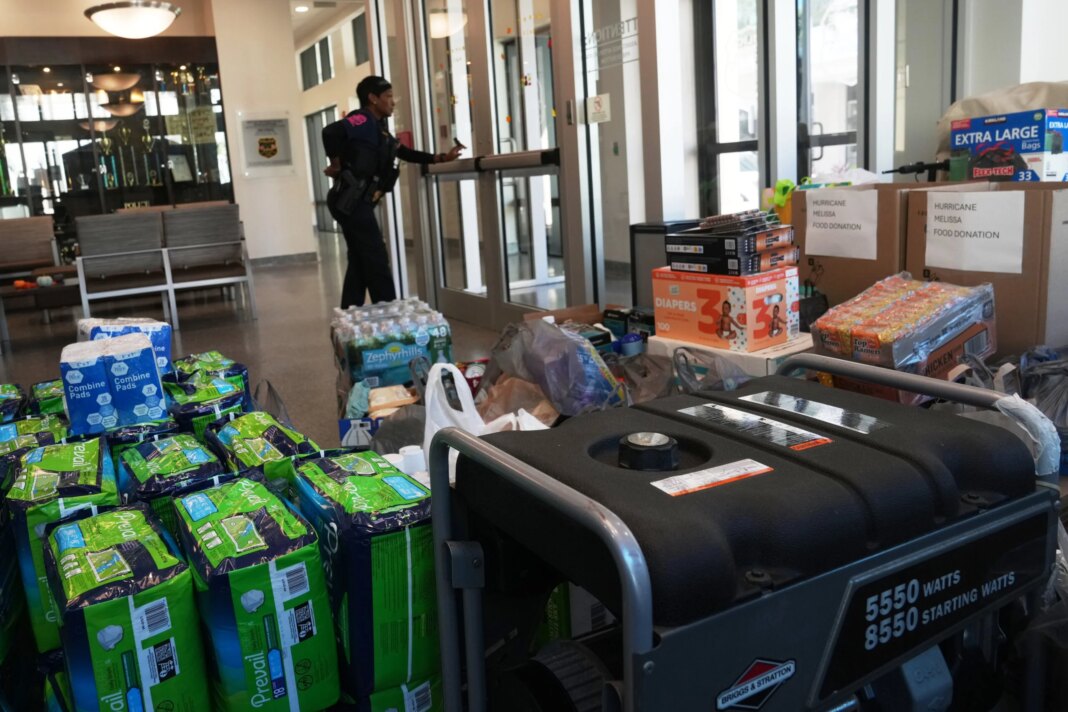COCONUT CREEK, Fla. (AP) — While South Florida was fortunate to be spared a direct hit from Hurricane Melissa, the storm’s impact was palpably felt by millions of residents with Caribbean roots. The massive storm, categorized among the strongest Atlantic hurricanes on record, resonated deeply within the hearts of the Caribbean diaspora.
From Miami to New York City, individuals with ties to Jamaica, Cuba, Haiti, and the Bahamas are mobilizing to provide support to their communities back home. They are transforming their heartbreak into action by filling warehouses with emergency supplies destined for regions severely affected by the storm. These efforts underscore the commitment that the diaspora has towards their homelands, reminding us of the profound connections that transcend geographic boundaries.
In cities like Miami and New York, which are often considered vibrant melting pots, the influx of immigrants has significantly shaped local culture and economies. Miami-Dade County, for instance, boasts a demographic where more immigrants call it home than native-born Americans. This trend is particularly striking, with over 721,000 immigrants moving to New York City and 553,000 to Miami so far this decade.
For many, Miami serves as an unofficial capital of Latin America. The lively salsa clubs of Little Havana and the vibrant streets of Little Haiti evoke a sense of closeness to the Caribbean, fostering a cultural bond that feels more intimate than what one might experience in other parts of the mainland U.S. Currently, Florida is home to over a million foreign-born Cubans and an estimated 231,000 foreign-born Jamaicans, while New York has 22,800 foreign-born Cubans and 225,000 Jamaicans, highlighting the significant diaspora community.
For many in the diaspora, ‘donation fatigue’ doesn’t apply
As the aftermath of Hurricane Melissa unfolds, many Haitian Americans are familiar with the painful experience of watching crises impact their homeland from afar. Carine Jocelyn, Chief Executive Officer of Brooklyn-based Diaspora Community Services, emphasizes that the sense of “donation fatigue” simply doesn’t apply when it comes to Haiti. For her, the ongoing support is crucial, especially given the enormous challenges posed by gang violence disrupting transportation in Port-au-Prince. Jocelyn is hopeful that resources will still reach Haiti through airports like Cap-Haïtien and Les Cayes.
Nonprofits play an essential role in facilitating aid. Organizations have indicated that cash donations are the most effective way to help, advising potential donors to consult platforms such as Charity Navigator or the Better Business Bureau’s Wise Giving Alliance to verify charities before contributing. Eugene Lapaine, president of the Association des Paysans Haut Douzieme, is on a mission to provide assistance to affected communities in southern Haiti, emphasizing the community’s strength in facing adversity.
‘We are ready to help’
On the ground in South Florida, local volunteers are uniting to provide immediate relief. In Coconut Creek, a bustling warehouse operated by Food For The Poor has become a hub for assembling emergency care kits, with dedicated teams actively loading pallets of food, water, and hygiene products. Susan James-Casserly, who traces her roots back to Jamaican cattle farming, embodies this spirit of service, flying to Jamaica next week to aid in the on-site relief efforts. “Jamaicans are very strong and resilient,” she remarks, fully aware that recovery will require immense strength and collaboration.
Similarly, Kivette Silvera, also Jamaican by birth and now residing in South Florida, recalls the harrowing experience of enduring the storm while huddled in prayer with her community. “Words can’t express what they’re going through right now. It’s devastating,” she expresses, illuminating the emotional toll wrought by natural disasters.
As the storm response mobilizes, local attorney Marlton Hill, who helps lead the group South Florida Caribbean Strong, describes a poignant blend of identity and commitment in these efforts. He notes, “For me being a born Jamaican and a raised American, this one hits different,” emphasizing the deeply personal stakes involved in responding to the devastation back home.
Donation sites pop up at fire stations, parks, local restaurants
In the neighboring suburb of Miramar, where the city council reflects a diverse Caribbean heritage, a citywide relief effort has emerged. Local officials are mobilizing to collect essential supplies for delivery to the islands. Residents can donate items such as shelf-stable food, water, tarps, and flashlights at designated donation sites, accessible around the clock.
Nearby, in Lauderhill, donation spots have been set up at city hall and local parks, while Jamaican restaurants have also opened their doors for collection. In Cooper City, Brittany and Dwayne Wolfe are turning their home into a drop-off center for diapers and other essentials through their organization, The Greater Fort Lauderdale Diaper Bank. Dwayne, originally from Mandeville in Jamaica, expresses a sense of urgency while waiting for news from loved ones back home. “I truly feel that a lot of folks that live in South Florida can really relate because we’re so close.”
Brittany adds that contributions have been pouring in from around the globe through their online fundraising platform, allowing the organization to prepare for their inaugural shipment to Jamaica. “It’s home,” she says, encapsulating the powerful emotional ties that bind the diaspora with their homelands. “And when things like this happen, you know, you have to help.”
___
Associated Press journalists Liseberth Guillaume in New York and Mike Schneider in Orlando, Florida, contributed reporting. Kate Payne is a corps member for The Associated Press/Report for America Statehouse News Initiative. Report for America is a nonprofit national service program that places journalists in local newsrooms to report on undercovered issues.



